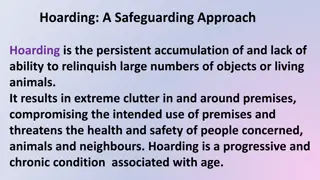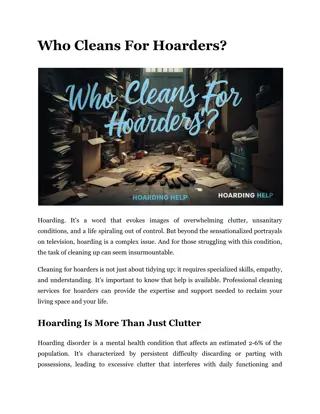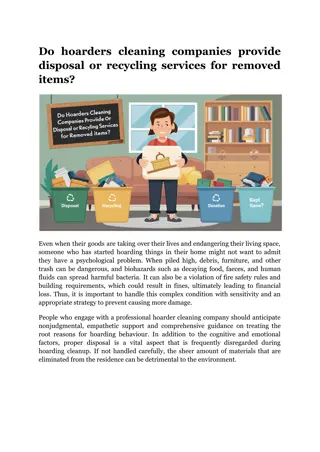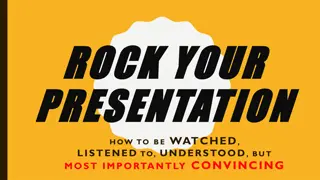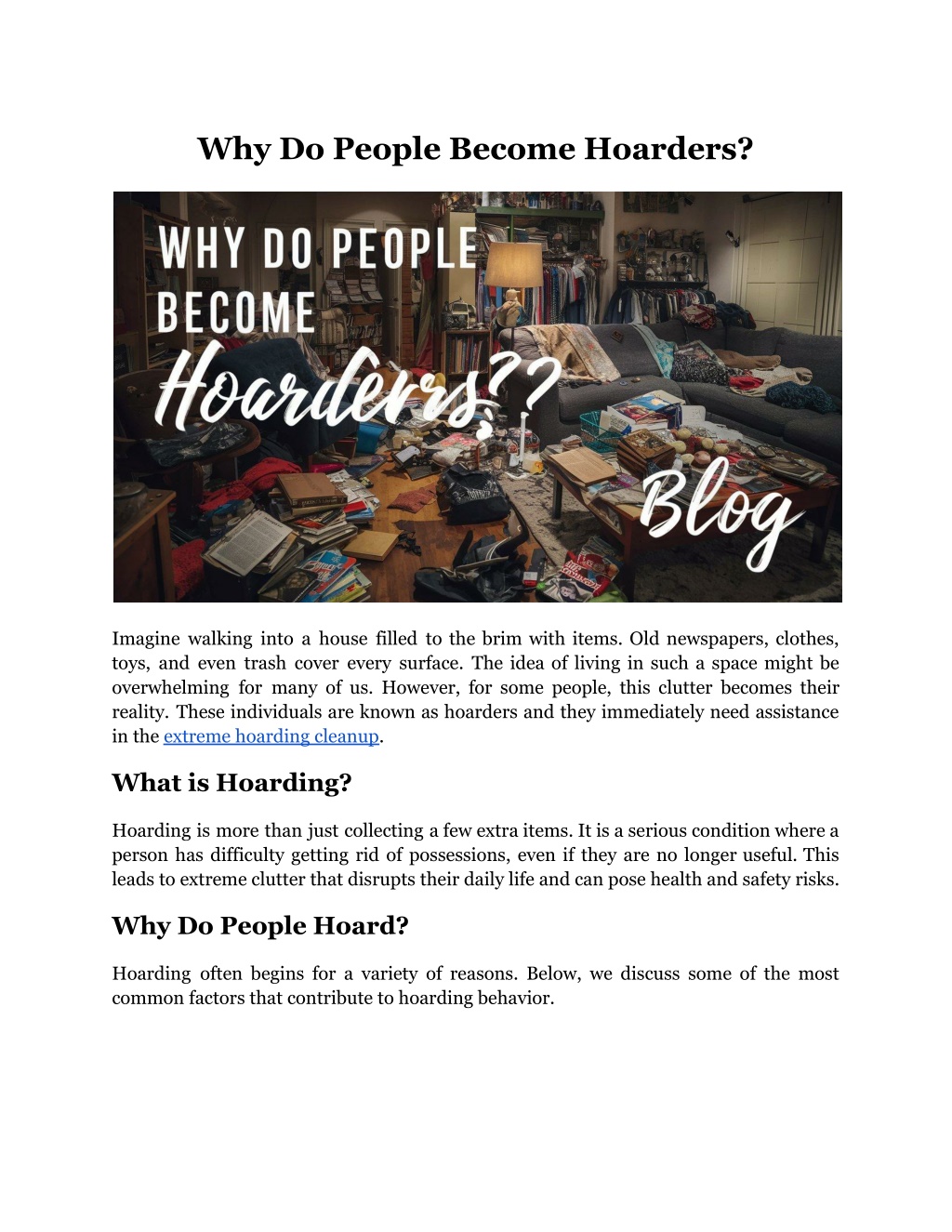
Why Do People Become Hoarders?
Explore the psychological reasons behind hoarding. Learn what causes people to hoard and how to help those affected.n
Download Presentation

Please find below an Image/Link to download the presentation.
The content on the website is provided AS IS for your information and personal use only. It may not be sold, licensed, or shared on other websites without obtaining consent from the author. Download presentation by click this link. If you encounter any issues during the download, it is possible that the publisher has removed the file from their server.
E N D
Presentation Transcript
Why Do People Become Hoarders? Imagine walking into a house filled to the brim with items. Old newspapers, clothes, toys, and even trash cover every surface. The idea of living in such a space might be overwhelming for many of us. However, for some people, this clutter becomes their reality. These individuals are known as hoarders and they immediately need assistance in the extreme hoarding cleanup. What is Hoarding? Hoarding is more than just collecting a few extra items. It is a serious condition where a person has difficulty getting rid of possessions, even if they are no longer useful. This leads to extreme clutter that disrupts their daily life and can pose health and safety risks. Why Do People Hoard? Hoarding often begins for a variety of reasons. Below, we discuss some of the most common factors that contribute to hoarding behavior.
1. Emotional Attachment Many hoarders develop strong emotional attachments to their belongings. They may feel that each item holds a special memory or significance. Throwing away these items can feel like losing a part of themselves. For example, a person might keep old toys because they remind them of their childhood or their children s younger years. These items become symbols of their past and represent important times or people in their lives. 2. Fear of Wasting Some individuals hoard because they fear wasting items that might be useful in the future. They believe that throwing things away is wasteful, and they might need these items someday. This mindset often leads to keeping things "just in case." For instance, someone might keep a broken appliance, thinking they will fix it one day, or save expired coupons in case they can use them later. 3. Sense of Security For some, hoarding creates a sense of security. Being surrounded by possessions can make them feel safe and protected from the outside world. This is especially true for individuals who have experienced loss or trauma. Their belongings become a shield against further emotional pain. This sense of security can be comforting, even if it leads to an unsafe living environment. 4. Mental Health Issues Hoarding is often linked to mental health conditions such as anxiety, depression, or obsessive-compulsive disorder (OCD). These conditions can make it challenging to make decisions about what to keep and what to discard. For example, someone with OCD might feel an intense need to keep certain items to prevent bad things from happening. Anxiety can make the thought of getting rid of possessions extremely distressing. Read More Articles: DIY Freezer Repair Tips for Homeowners Emotional Impact of Hoarding Hoarding can take a severe emotional toll on individuals and their families. Below, we explore some of the emotional impacts.
1. Shame and Embarrassment Many hoarders feel deep shame and embarrassment about their living conditions. They may avoid inviting friends or family over, leading to isolation and loneliness. This isolation can exacerbate feelings of depression and anxiety. The shame associated with hoarding can also prevent individuals from seeking help, as they may fear judgment from others. 2. Stress and Anxiety Living in a cluttered environment can be extremely stressful. The constant presence of clutter can cause anxiety and make it difficult to relax or focus. Everyday tasks, such as cooking or cleaning, become overwhelming and can contribute to a sense of hopelessness. The stress of living in a cluttered space can also lead to physical symptoms, such as headaches and fatigue. 3. Relationship Strain Hoarding often strains relationships with family members and friends. Loved ones may not understand the hoarder s behavior, leading to conflicts and misunderstandings. Family members may feel frustrated or helpless, and arguments about clutter can become frequent. This strain can lead to a breakdown in communication and further isolate the hoarder. Case Study: Understanding the Research To better understand the impact of hoarding, let's look at a research study conducted by Dr. David Tolin at the Anxiety Disorders Center in Connecticut. Dr. Tolin's study involved 107 individuals with hoarding disorder. The study found that 75% of participants had significant difficulty discarding items due to emotional attachment and fear of wasting. Factor Percentage of Participants Emotional Attachment 75% Fear of Wasting 60%
Sense of Security 55% Mental Health Issues 80% This table shows the percentages of participants who identified with each factor. It highlights that emotional attachment and mental health issues are the most common reasons for hoarding. Impact on Daily Life Hoarding doesn't just affect emotions; it also impacts daily living. Here are some ways hoarding can disrupt everyday life: 1. Health Risks Cluttered homes can be a breeding ground for dust, mold, and pests. This can lead to respiratory issues, allergies, and other health problems. For example, piles of newspapers can attract insects, and decaying food items can harbor bacteria. The unsanitary conditions can lead to infections and exacerbate chronic health conditions. 2. Safety Hazards Excessive clutter can block exits and create fire hazards. In an emergency, it can be difficult to move quickly or safely exit the home. Additionally, items stacked precariously can fall and cause injuries. Hoarders often face a higher risk of falls and accidents within their homes. 3. Financial Strain Hoarding can lead to financial strain as individuals continue to buy items they don't need. Additionally, they may spend money on storage units to keep their possessions. The cost of maintaining and storing excess items can add up, leading to financial difficulties. In some cases, hoarders may face fines or legal issues due to unsafe living conditions. Read More Articles: From Paintbrush to Smartphone: The Evolution of Bird Identification Since "The Birds of America Book" How to Help a Hoarder Helping a hoarder can be challenging, but it is possible with patience and understanding. Here are some steps that can be taken to support someone with hoarding behavior:
Show Compassion Approach the hoarder with empathy and compassion. Understand that their possessions hold significant emotional value to them. Avoid judgmental language and be supportive. Let them know you are there to help and not to criticize. Encourage Professional Help Suggest seeking help from a mental health professional who specializes in hoarding disorder. Therapy can help address the underlying issues and develop strategies for decluttering. Cognitive-behavioral therapy (CBT) is particularly effective in treating hoarding disorder. Encourage the hoarder to attend support groups where they can share their experiences and learn from others. Offer Practical Assistance Help with small tasks, like organizing a single room or sorting through a specific type of item. Breaking down the process into manageable steps can make it less overwhelming. Be patient and celebrate small victories. Offer to help with physical tasks that might be difficult for the hoarder, such as moving heavy items or cleaning. Set Realistic Goals Work together to set realistic and achievable goals for decluttering. Celebrate small victories to build momentum and motivation. Understand that progress may be slow and setbacks may occur. Keep a positive attitude and remind the hoarder of the benefits of a clutter-free environment. Conclusion Hoarding is a complex issue rooted in deep emotional and psychological factors. Understanding why people hoard can foster empathy and compassion for those struggling with this condition. By offering support and encouraging professional help, we can help hoarders reclaim their lives and create safer, healthier living environments. Remember, the journey to overcoming hoarding is a marathon, not a sprint, and every small step counts. Are you or a loved one struggling with extreme hoarding? At LifeCycle Transition, we understand that hoarding can be overwhelming and emotionally challenging. Our compassionate and professional team specializes in extreme hoarding cleanup. Site Article: Why Do People Become Hoarders?










